Drugmakers set to gain as taxpayers foot new opioid costs
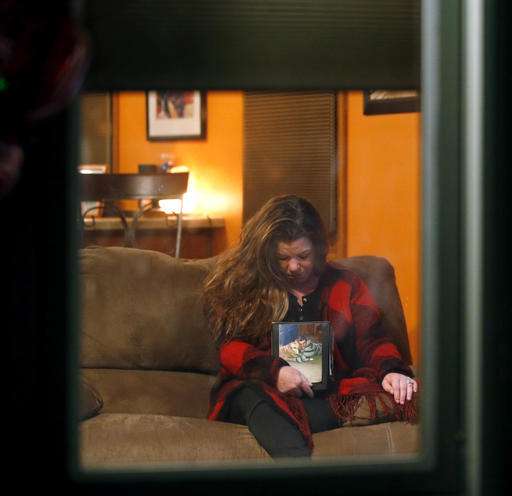
Critics say the answer pharmaceutical companies are pushing to address the ongoing opioid crisis boosts their profits while forcing taxpayers to shoulder the costs.
Some drugmakers aim to replace ubiquitous painkillers such as Vicodin and Percocet with harder-to-abuse formulations that are patent-protected and command higher prices—a plan that could cost government-funded health programs hundreds of millions of dollars in higher medication expenses.
A pending measure in Illinois, for example, would cost taxpayers $55 million annually to cover the higher-priced drugs for state Medicaid recipients, according to an initial state analysis. A proposal in Ohio was estimated to bring $167 million in higher costs.
And on the federal level, an industry-backed provision benefiting reformulated opioids tucked into a law this summer will cost the federal government $75 million in lost Medicaid payments over 10 years, according to an estimate by the Congressional Budget Office.
Proponents of the drugs say switching to the new formulations could save taxpayers money if addictions decline, though there is little evidence now that they reduce rates of either addiction or overdoses.
The prescription painkiller epidemic costs the U.S. economy $78.5 billion annually, according to a Centers for Disease Control and Prevention report this year.
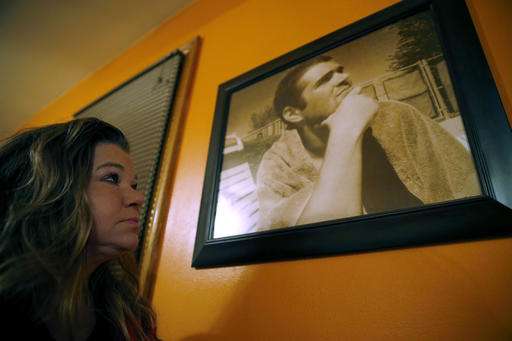
"We have an enormous prescription-drug abuse problem in Illinois that's costing a lot of money," said Jonathan Pearl, chief of staff for Democratic Illinois Rep. Kelly Cassidy, who signed on to the industry-backed legislation requiring coverage of the new drugs. "This isn't the only way to address it. It's not a silver bullet, but it's something."
Still, industry critics worry that the focus on revamped painkillers is funneling resources away from other measures needed to tame the nation's drug epidemic. The drugs typically make it harder for users to crush them to snort or inject, but still can be abused.
"I'm frustrated that people would be burning a lot of public energy and resources on issues that are not key to stopping the epidemic," said Dr. Gary Franklin, a University of Washington research professor who also is a vice president with Physicians for Responsible Opioid Prescribing, a group that advocates for reduced opioid prescribing.
Sweeping federal legislation passed this summer was designed to expand medication-based addiction treatment and overdose-reversal drugs through grants to state and local health providers. But lawmakers also included language long favored by drugmakers that exempts the companies from paying higher rebates worth $75 million over 10 years for reformulated opioids to Medicaid, the state-federal health plan for low-income Americans.

Industry advocates argued for months that reformulated opioids should not face the higher rebates, which they said discourage investment in abuse-deterrent technology—a stance the Obama administration eventually endorsed in its budget proposal.
Companies that make abuse-deterrent drugs, including Purdue Pharma, Pfizer and Endo, spent more than $1.7 million on lobbying efforts that included the opioid bill as it made its way through Congress.
Purdue spokesman Robert Josephson said his company supports public policies addressing the opioid epidemic, "including through appropriate and affordable patient access to opioid pain medicines with abuse-deterrent properties."
Pfizer spokeswoman Sharon Castillo gave similar reasons for her company's support of the measure. An Endo spokeswoman declined to comment on the legislation.

The language sought by industry was introduced by retiring Rep. Joe Pitts, R-Pa., who received more than $50,000 in political donations from makers of revamped opioids over the past decade.
Pitts did not grant repeated requests for an interview, but a spokeswoman offered a statement saying the amendment "would simply remove a penalty on manufacturers who do the right thing by creating an abuse-deterrent formulation."
Sen. Ron Wyden, D-Ore., made a last-ditch effort to kill the language in a House and Senate conference session.
A frequent critic of the pharmaceutical industry, despite receiving more than $40,000 from opioid drugmakers to his campaigns and his leadership PAC in the past decade, Wyden proposed eliminating the exemption and using the $75 million to fund addiction treatment for low-income pregnant women, who must forfeit their Medicaid prenatal coverage before seeking treatment.
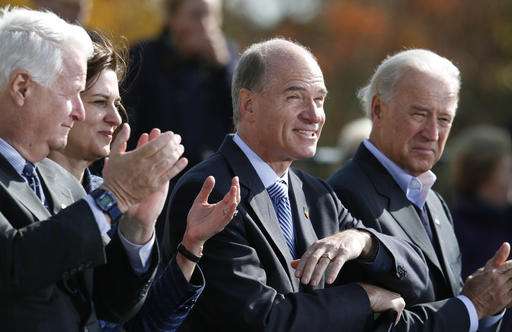
"Colleagues, this is a pretty obvious choice," Wyden said. "We're either going to choose low-income, pregnant women—you do that by voting for my amendment—or you go with the companies who are getting a windfall here."
His proposal was defeated. The law took effect in July.
-
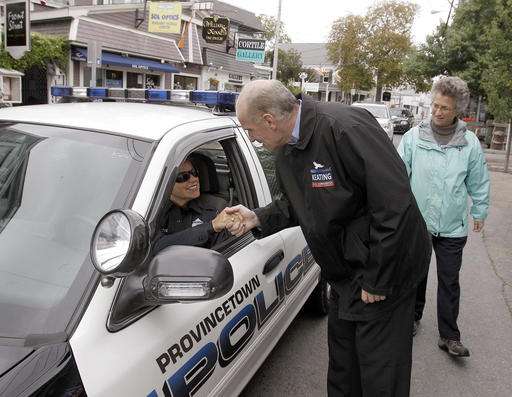
In this Oct. 16, 2010 file photo Democratic candidate for the Massachusetts 10th congressional district Bill Keating greets a police office in her cruiser on Commercial Street while campaigning in Provincetown, Mass, as State Rep. Sarah Peake, right, looks on. Keating first introduced a bill in 2012 and tried again in 2013 and 2015 that would require the FDA to gradually replace all opioids with harder-to-abuse versions. (AP Photo/Stephan Savoia, File) -
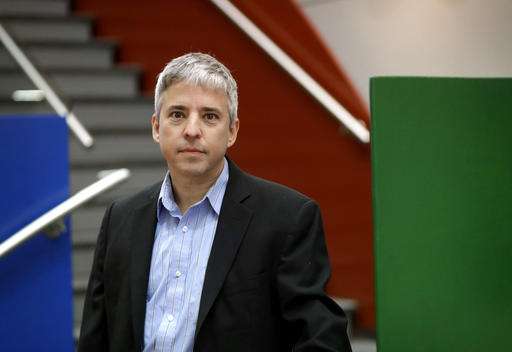
In this Monday, Dec. 5, 2016 photo, Dr. Caleb Alexander, co-director of Johns Hopkins University's Center for Drug Safety and Effectiveness, poses for a photograph in Baltimore. Companies that make powerful painkillers are pushing for policies boosting new versions as a solution to the addiction epidemic, even though there's little proof they reduce the number of overdoses or deaths. The drugmakers say abuse-deterrent opioids are one tool for addressing a major problem. But critics worry the focus on them could distract from more productive steps. "My concern is that they'll contribute to a perception that there is a safe opioid, and there's no such thing as a fully safe opioid, " said Alexander. (AP Photo/Patrick Semansky) -
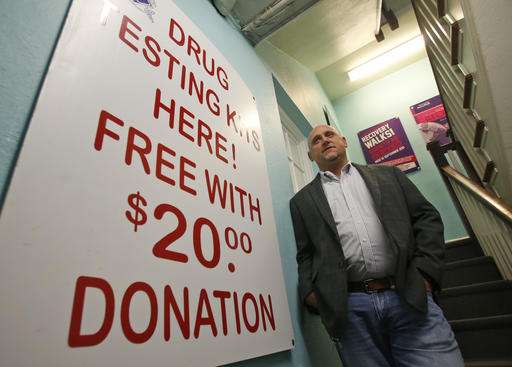
In this Monday, Dec. 5, 2016, photo, David Rook, operations manager for the McShin Foundation, poses in the foundation's offices in Richmond, Va. With American communities still reeling from an epidemic of prescription painkiller abuse, pharmaceutical companies are aggressively pushing their preferred answer to the problem: a new generation of harder-to-manipulate drugs that are racking up billions in sales but aren't proven to reduce rates of overdoses and deaths. Before entering treatment, Rook said, he would break down abuse-deterrent OxyContins and crush-resistant Opanas using water, lemon juice and a microwave. "The truth is an addict can find a way to abuse a medication one way or the other," he said. (AP Photo/Steve Helber) -
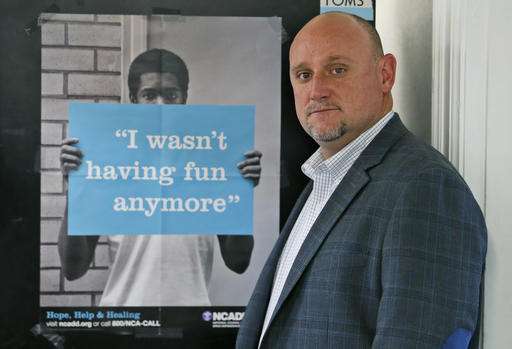
In this Monday, Dec. 5, 2016, photo, David Rook, operations manager for the McShin Foundation, poses next to a poster in the foundation's offices in Richmond, Va. With American communities still reeling from an epidemic of prescription painkiller abuse, pharmaceutical companies are aggressively pushing their preferred answer to the problem: a new generation of harder-to-manipulate drugs that are racking up billions in sales but aren't proven to reduce rates of overdoses and deaths. Before entering treatment, Rook said, he would break down abuse-deterrent OxyContins and crush-resistant Opanas using water, lemon juice and a microwave. "The truth is an addict can find a way to abuse a medication one way or the other," he said. (AP Photo/Steve Helber)
© 2016 The Associated Press. All rights reserved.



















